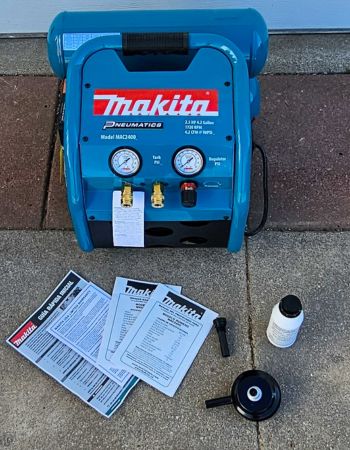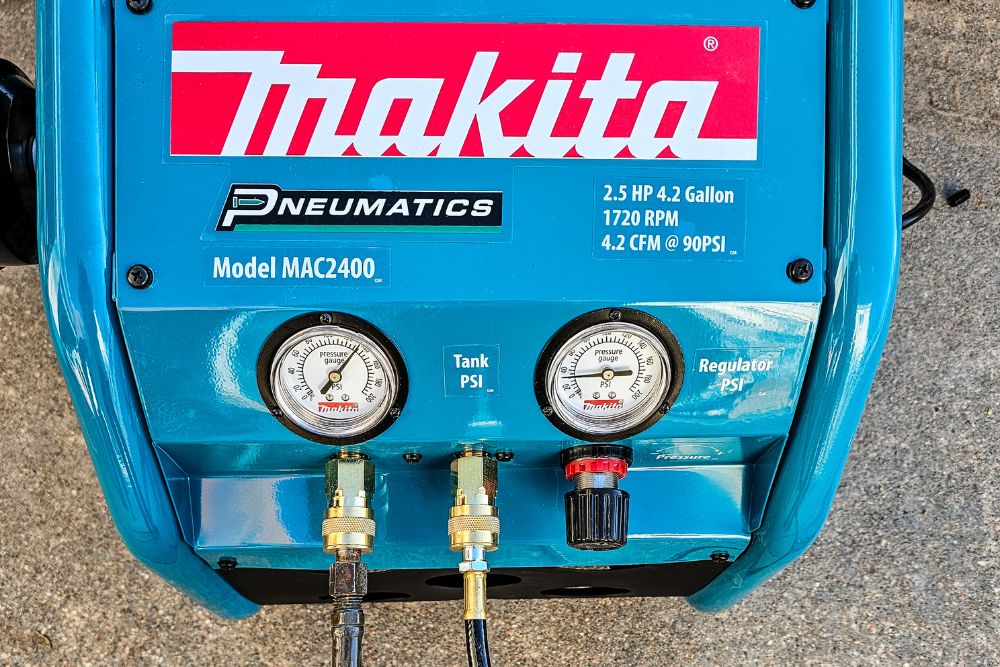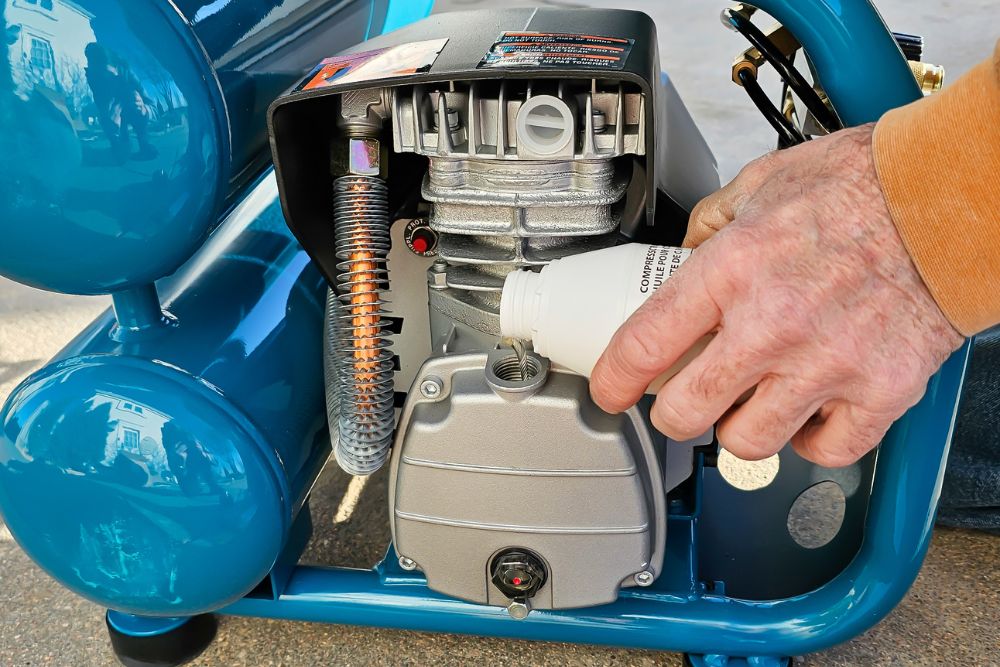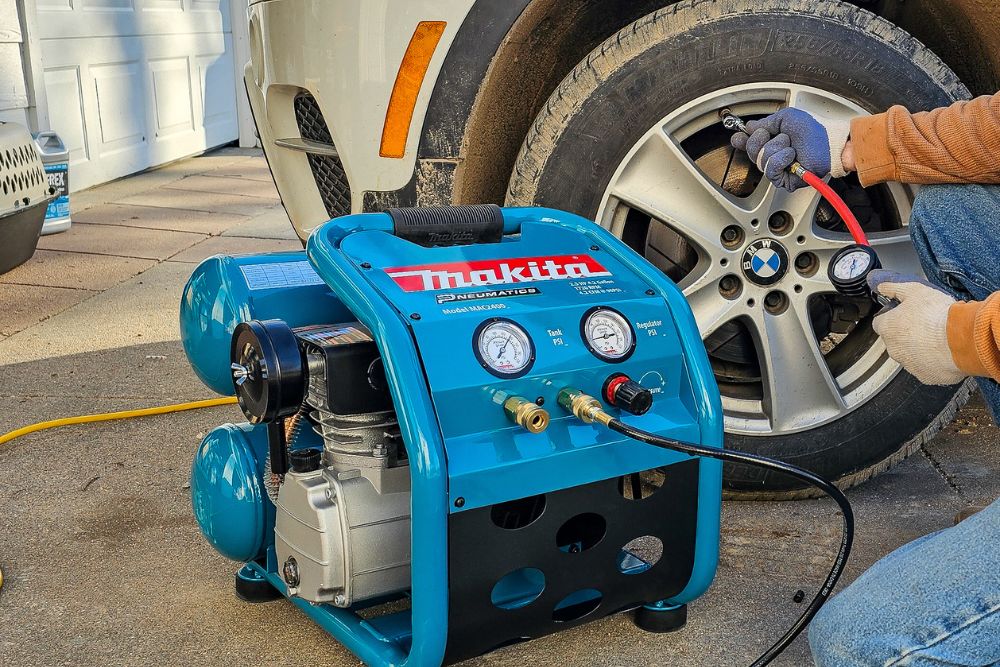We may earn revenue from the products available on this page and participate in affiliate programs. Learn More ›
Swinging a hammer is still a trusted way of driving nails to build fences and structures, but using a nail gun is much faster and less labor-intensive. While I like using battery-powered tools, I’m not a fan of stopping to charge spent batteries. I prefer going the pneumatic route when I need a consistent power source, which means having a quality air compressor.
Recently, I tested several portable air compressors in my garage and workshop—and on the jobsite—and the Makita MAC2400 earned top honors. This compact 2.5-horsepower (hp) compressor isn’t perfect, but it’s very effective at powering the air tools necessary for framing, trim work, and other DIY projects. Keep reading to discover what happened when I put the MAC2400 to the test.
Makita MAC2400 2.5 HP Air Compressor: At a Glance

Rating: 4.75/5
SPECS
- Type: Portable
- Power source: Electric
- Maximum pressure: 130 pounds per square inch (PSI)
- Tank size: 4.2 gallons
- Weight: 77 pounds
- Cubic feet per minute (CFM) at 90 PSI: 4.2
PROS
- Powerful 2.5 hp motor and dual ports for versatility and high performance
- Easy-to-read glass oil level gauge makes it simple to know when the oil level drops
- Much quieter at 79 decibels than many shop compressors
- Roll bar around the top and sides adds a level of protection on busy jobsites
CONS
- Lack of wheels and heavier weight—77 pounds—reduces portability
- Single regulator knob for both ports dictates use of tools with similar PSI requirements
Get the Makita MAC2400 air compressor at:

What is the Makita MAC2400 air compressor?
The Makita MAC2400 is a midrange portable air compressor in the Makita Big Bore lineup of compressors. It features a 2.5 hp motor, a cast-iron cylinder for maximum air compression, and 4.2-gallon twin tanks designed to deliver a sustained operating pressure of 130 PSI.
This Makita compressor produces 4.2 CFM when operated at 90 PSI. It’s designed for the rigors of a jobsite and includes a built-in roll bar along the top and sides to protect the compressor from being knocked over or otherwise damaged.
One of the compressor’s handiest features is the dual ports that allow the connection of two pneumatic tools simultaneously. I’m familiar with the use of inline adapters that permit two workers to use one air compressor at the same time, but having twin ports adds to the user-friendly appeal of this compressor.
The Makita air compressor is relatively compact, measuring just 20 inches long by 18 inches wide by 18.75 inches high with a 6-foot cord, so it doesn’t require a lot of storage space in a garage or shed. This portability makes it an excellent choice for either a work or a home air compressor.
Power and Performance
The Makita air compressor has an oil-lubricated pump, so I first added motor oil (included) to the crankcase and then attached the air filter. Those steps only took about 3 minutes. The MAC2400 features a handy glass oil gauge that allowed me to see the oil level at a glance, which is much simpler than having to check a dipstick.
After following the manufacturer-recommended break-in period, which required allowing the compressor to run for 20 minutes before attaching any pneumatic tools, I started testing. First, I connected a ¼-inch air hose (not included) and a nail gun and adjusted the PSI gauge to 80, (recommended by the nail gun manufacturer). I was able to drive 12 nails before the compressor cycled on. When I attached a pinner, I could shoot 22 nails before the compressor cycled on. I had similar results when I connected two nail guns to the compressor’s two ports. One important note: There is only one regulator knob for both ports, so a user will want to run tools with similar PSI requirements if using both ports.
Next, I attached a pneumatic impact wrench, turned the PSI to 100, and removed the lug nuts from a car tire. The compressor cycled after I removed two nuts, which is understandable because the tool uses more air power. Still, the MAC2400 rose to the challenge. This compressor has ample power for operating nail guns and air impact wrenches, although it will cycle more frequently when using higher PSI tools.

Sound Considerations
Some air compressors are notoriously noisy, like my large shop compressor that produces close to 90 decibels of ear-splitting sound every time it cycles on and inevitably startles me even though I’m expecting it.
Although the Makita MAC2400 is not the quietest air compressor I’ve ever used, it is pleasantly quieter than many I’ve tried over the years. The manufacturer lists the compressor as producing 79 decibels of sound; however, I tested the noise level during an active cycle at just 72 decibels from about 6 feet away. While it’s still noticeable, the sound level is more like a vacuum cleaner than a jet taking off—it’s bearable and less likely to annoy the neighbors.
The Portability Factor
The Makita MAC2400 is small in size and comes with a padded handle at the top for lifting it in and out of a truck bed or onto a table. Unfortunately, this air compressor weighs a hefty 77 pounds, so it may be too heavy for some users (like me) to lift without assistance.
I wish the manufacturer would have added wheels to the MAC2400 air compressor so it would be easier to pull from spot to spot, but—as it is—I found it handy to roll around on a small homemade platform dolly. The higher weight of this compressor is likely due to its steel construction, and I think most users will put up with extra weight to get a higher-quality compressor that is designed to last.
Is the Makita MAC2400 air compressor right for you?
At a price of around $380, the Makita MAC2400 air compressor is a great value for its features and performance. Shoppers looking for a powerful and reliable air compressor with dual ports won’t be disappointed with this model.
The MAC2400 is well suited for most DIY construction projects and will also do well in a pinch for many types of automotive work. However, if you are using an air impact wrench consistently, you may want to upgrade to a higher-capacity Makita model, such as the MAC5200 3 HP Big Bore air compressor.
Alternatively, if you’re looking for a portable air compressor for light-duty projects, such as finish work, you could get by with a lower-capacity model that doesn’t weigh nearly as much as the MAC2400.
Overall, the Makita MAC2400 air compressor is a powerful choice for DIYers looking for a medium-duty construction air compressor for various building tasks.
Where to Buy the Makita MAC2400 2.5 HP Portable Air Compressor
Get the Makita MAC2400 air compressor at:
Meet the Tester
Glenda Taylor is a product tester and writer specializing in the construction, remodeling, and real estate industries. She and her husband own a general contracting company, and Taylor is experienced in both residential and commercial building applications. She tests a wide range of power tools, as well as other home improvement, household, and lawn and garden products.


